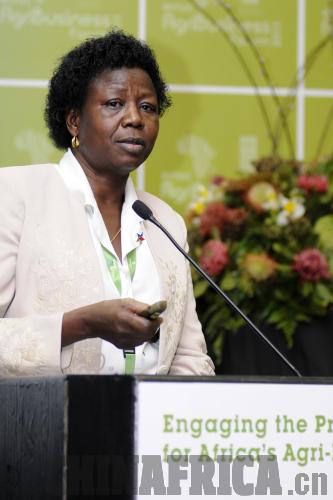|
 |
|
NEW MARKETS: South Sudan Minister of Agriculture and Forestry Betty Achan Ogwaro calls for foreign investment into agriculture |
Becoming the newest nation in today's world fraught with change and instability is in itself no mean feat: South Sudan achieved just that on July 9 in 2011. The world watched as a region, once gripped by civil war, stepped into a new era of potentially long-term stability and economic importance for the African continent and beyond.
Handling the world's expectations and the realities of being an African nation, and all that this entails, can be viewed as a cause for celebration and of great responsibility.
There is added attention, and therefore pressure, as the world observes its newest nation acquire 75 percent of Sudan's oil reserves. South Sudan has obtained a commodity the world desperately needs for its economic survival. However, South Sudan's oil reserves need to pass by Sudan's refineries and the pipelines to the Red Sea, putting a twist on the potential economic growth and stability of this newfound wealth.
This twist of fate has already become a reality. In less than six months of existence, the uncertainties of being an oil-rich nation came to the forefront with South Sudan shutting down its oil production in response to Sudan's seizure of oil tankers.
Predictions for a country depending mainly on oil can seem obvious: Enormous wealth for the ruling elite and if mismanaged, disastrous effects for the rest of the population. This, in addition to the country's food imports exceeding $1.9 billion in 2010, due to lack of basic infrastructure and resources, could be a recipe for disaster.
However, the nation's young government has eyed potential sectors to counter balance its oil-dependency. Betty Achan Ogwaro, South Sudan's Minister of Agriculture and Forestry, told an international audience in October 2011 that the country is open for business, "We are inviting international investors to invest in our country's agricultural potential," she stated.
The country has a potential for a variety of agricultural products: the Greenbelt is able to produce palm oil, tea & coffee, fruits, Irish potatoes, maize, vegetables, and tropical forestry. The Ironstone Plateau is excellent ground to grow sorghum, groundnuts, sesame, sunflower and livestock. The Nile Soba with its alluvial soils has ideal conditions for sugar cane, rice and sorghum exploitation. The country's flood plains can accommodate a variety of crops: sorghum, rice, sugar cane, sesame and groundnuts and the hills and mountains are excellent climatic grounds to grow tea, coffee, temperate fruits such as apples and grapes, forest plantations. South Sudan's varied natural resources can, if managed correctly, be the long-term source of stability and economic growth, whilst weaning itself off its potential oil dependency.
In addition, there are specific and immediate prospects, Ogwaro added. "We have opportunities also in beef production, with over 2.5 million heads of cattle. We also have a huge potential for organic foods, as South Sudanese producers use almost no fertilizer."
In a clear statement of intent the Minister concluded, "South Sudan is open for business and we are looking forward to welcoming investment."
The wider international community also views the potential for business positively. Hillary Clinton, the U.S. Secretary of State, claimed that South Sudan could be one of Africa's bread baskets, announcing that America would partner with the private sector to help supply advanced technologies to boost farmers' yields.
Furthermore, the European Union agreed to provide $265.2 million to South Sudan, focusing on a number of specific priority sectors: agriculture development, health, education, and the rule of law, with $106 million allocated to the rural development/food security sector.
Both Ogwaro and Clinton want the same thing: South Sudan's independence in more ways than one, which means being able to feed itself and not to become addicted to the vast oil revenues.
The Ministry of Agriculture and Forestry seems to have already carved out potential areas for growth, which in turn shows signs of commitment to ensure the country's rich terrains are exploited correctly. It now has to convince the rest of the government, its population, neighbors and the international community to invest time, effort, hard work and cash to ensure healthy economic diversification.
The writer is Communications Manager of EMRC – an internationally renowned organization providing a platform for Africa's private and public sector to come together - www.emrc.be |